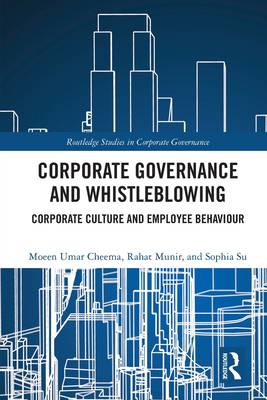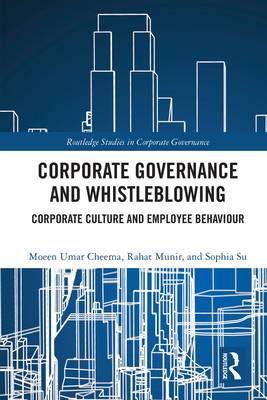
- Afhalen na 1 uur in een winkel met voorraad
- Gratis thuislevering in België vanaf € 30
- Ruim aanbod met 7 miljoen producten
- Afhalen na 1 uur in een winkel met voorraad
- Gratis thuislevering in België vanaf € 30
- Ruim aanbod met 7 miljoen producten
Corporate Governance and Whistleblowing
Corporate Culture and Employee Behaviour
Moeen Umar Cheema, Rahat Munir, Sophia SuOmschrijving
Whistleblowing is often about disclosing wrongdoings by members of organisations to persons or organisations that may be able to effect action. Media would at times publish stories of whistleblowers who engage in 'heroic' acts of exposing wrongdoings at work, but the whistlebowers often face significant negative consequences of their whistleblowing efforts. This book examines effects of national and organisational cultures on the whistleblowing decisions of employees.
The book provides empirical evidence of association between organisational culture and whistleblowing and there appears to be a lower likelihood of whistleblowing in organisations that focus more on the cultural dimensions of respect for people, innovation and stability. It also illustrates how remaining silent or blowing the whistle in response to observed wrongdoings affects employees' key work-related attitudes.
This book would interest those wish to gain better understanding of the relationship between culture and whistleblowing in organisations.
Specificaties
Betrokkenen
- Auteur(s):
- Uitgeverij:
Inhoud
- Aantal bladzijden:
- 172
- Taal:
- Engels
- Reeks:
Eigenschappen
- Productcode (EAN):
- 9780367764531
- Verschijningsdatum:
- 9/01/2023
- Uitvoering:
- Paperback
- Formaat:
- Trade paperback (VS)
- Afmetingen:
- 156 mm x 234 mm
- Gewicht:
- 263 g

Alleen bij Standaard Boekhandel
Beoordelingen
We publiceren alleen reviews die voldoen aan de voorwaarden voor reviews. Bekijk onze voorwaarden voor reviews.











